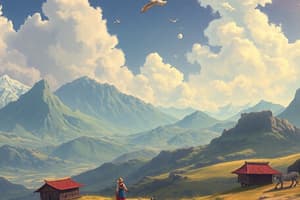Podcast
Questions and Answers
What major event triggered the onset of World War I?
What major event triggered the onset of World War I?
- The deployment of trench warfare
- The signing of the Treaty of Versailles
- The sinking of the Lusitania
- The assassination of Archduke Franz Ferdinand (correct)
Which of the following statements accurately describes a characteristic of Democracy?
Which of the following statements accurately describes a characteristic of Democracy?
- Citizens participate in decision-making through elected representatives (correct)
- Decisions are made by a single leader
- No legal constraints are placed on government authority
- Power is concentrated within a ruling party
Which branches of science focuses on the study of substances and their reactions?
Which branches of science focuses on the study of substances and their reactions?
- Astronomy
- Physics
- Biology
- Chemistry (correct)
What are the five major oceans of the world?
What are the five major oceans of the world?
Which of the following is a hallmark of the Renaissance art movement?
Which of the following is a hallmark of the Renaissance art movement?
Which author is known for the play 'Hamlet'?
Which author is known for the play 'Hamlet'?
What global issue is related to environmental changes affecting weather patterns?
What global issue is related to environmental changes affecting weather patterns?
What document is regarded as the foundation of American government?
What document is regarded as the foundation of American government?
Which form of governance is characterized by centralized control by a single ruler?
Which form of governance is characterized by centralized control by a single ruler?
Which of the following accurately describes the Scientific Method?
Which of the following accurately describes the Scientific Method?
Flashcards are hidden until you start studying
Study Notes
General Knowledge Study Notes
History
- Ancient Civilizations: Key empires include Mesopotamia, Egypt, Greece, and Rome.
- World Wars:
- WWI (1914-1918) triggered by the assassination of Archduke Franz Ferdinand.
- WWII (1939-1945) involved major powers and was marked by events like the Holocaust and the use of atomic bombs.
Geography
- Continents: There are seven continents: Asia, Africa, North America, South America, Antarctica, Europe, Australia.
- Oceans: The five oceans are the Pacific, Atlantic, Indian, Southern, and Arctic.
Science
-
Branches of Science:
- Physics: Study of matter and energy.
- Chemistry: Study of substances and their reactions.
- Biology: Study of living organisms.
-
The Scientific Method: Steps include observation, hypothesis, experimentation, analysis, and conclusion.
Literature
- Genres: Common genres include fiction, non-fiction, poetry, drama, and fantasy.
- Famous Authors:
- William Shakespeare: Known for plays like "Hamlet" and "Romeo and Juliet."
- Jane Austen: Noted for novels such as "Pride and Prejudice" and "Emma."
Arts
- Visual Arts: Includes painting, sculpture, and photography.
- Major Art Movements:
- Renaissance: Emphasis on realism and humanism.
- Impressionism: Focus on light and color.
Politics
-
Political Systems:
- Democracy: Government by the people, typically through elected representatives.
- Dictatorship: Centralized control by a single ruler or party.
-
Key Documents:
- U.S. Constitution: Foundation of American government.
- Magna Carta: Early document establishing the principle of legal limits on government power.
Technology
- Internet: A global network connecting millions of private, public, academic, business, and government networks.
- Artificial Intelligence: Field of computer science focused on creating systems capable of performing tasks that typically require human intelligence.
Current Events
- Global Issues: Climate change, economic disparity, and health crises (e.g., pandemics).
- International Organizations:
- United Nations (UN): Promotes international cooperation.
- World Health Organization (WHO): Focuses on public health.
Miscellaneous
-
World Capitals:
- Tokyo (Japan)
- Paris (France)
- Washington, D.C. (USA)
-
Important Dates:
- Independence Day (USA) - July 4
- Bastille Day (France) - July 14
These notes cover a broad range of general knowledge topics, providing foundational facts and concepts for further exploration.
History
- Ancient civilizations shaped human development; significant empires include Mesopotamia, Egypt, Greece, and Rome.
- WWI (1914-1918) sparked by the assassination of Archduke Franz Ferdinand, resulting in widespread conflict across Europe.
- WWII (1939-1945) involved major powers globally and featured pivotal events like the Holocaust and the use of nuclear weapons in Hiroshima and Nagasaki.
Geography
- The seven continents of the world are Asia, Africa, North America, South America, Antarctica, Europe, and Australia.
- Earth's five oceans include the Pacific, Atlantic, Indian, Southern, and Arctic, each covering significant portions of the planet's surface.
Science
- Key branches of science encompass:
- Physics: Examines matter and energy interactions.
- Chemistry: Investigates substances and their chemical reactions.
- Biology: Studies living organisms and their ecosystems.
- The scientific method consists of observation, hypothesis formulation, experimentation, data analysis, and conclusion drawing.
Literature
- Common literary genres include fiction, non-fiction, poetry, drama, and fantasy, each with unique characteristics and storytelling approaches.
- William Shakespeare is renowned for influential plays such as "Hamlet" and "Romeo and Juliet," while Jane Austen is celebrated for her novels including "Pride and Prejudice" and "Emma."
Arts
- Visual arts encompass various forms such as painting, sculpture, and photography, each conveying emotions and ideas.
- Major art movements include:
- Renaissance: Focus on realism and humanism, reviving classical concepts.
- Impressionism: Emphasis on capturing light and color in innovative ways.
Politics
- Political systems vary widely:
- Democracy emphasizes government by the people, often through elections.
- Dictatorship centralizes power in a single leader or political party.
- Key historical documents include:
- The U.S. Constitution, establishing the framework of American government.
- Magna Carta, a foundational text asserting limits on governmental authority.
Technology
- The Internet serves as a vast global network connecting various entities, enhancing communication and access to information.
- Artificial Intelligence (AI) is a computer science domain focused on developing systems that mimic human cognitive functions and perform tasks autonomously.
Current Events
- Global issues such as climate change, economic inequality, and health crises like pandemics remain pressing challenges for societies worldwide.
- International organizations like the United Nations (UN) work to foster global cooperation, with the World Health Organization (WHO) dedicated to improving public health outcomes.
Miscellaneous
- Notable world capitals include Tokyo (Japan), Paris (France), and Washington, D.C. (USA), each serving as political and cultural hubs.
- Important national dates include Independence Day on July 4 in the USA and Bastille Day on July 14 in France, commemorating pivotal events in each nation's history.
Studying That Suits You
Use AI to generate personalized quizzes and flashcards to suit your learning preferences.




